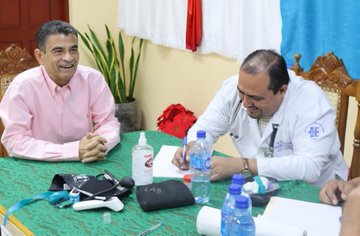The dictatorship in Nicaragua headed by President Daniel Ortega and his wife, Vice President Rosario Murillo, on Jan. 2 released recent images of the bishop of Matagalpa, Rolando Álvarez, shortly after the United States government demanded his immediate release.
In an official statement, the Nicaraguan government published various photographs documenting a medical checkup performed Jan. 2 on Álvarez, who has been held in custody for more than 500 days.
The prelate was placed under house arrest in August 2022 and in February 2023 sentenced by the dictatorship to 26 years and four months in prison on allegations of treason.
The statement reported that the checkup was done by Dr. Yesser Rizo in the presence of the general commissioners of the police, Zhukov Serrano and Luis Barrantes.
“Medical care began at 3:25 p.m. and concluded at 3:40 p.m. Vital signs: Blood pressure 120/60; 84 heartbeats per minute; oxygen saturation 99%; heartbeat regularity 88,” the statement said.
“During the medical care Rolando Álvarez Lagos expressed that he feels well and continues to exercise. The doctor reported that Rolando Álvarez’s vital signs and state of health are fine. He did not undergo blood tests because he had eaten food,” the dictatorship’s statement concluded.
The images released show the bishop looking thinner. The last time he was shown to the media was at the end of November 2023, when the regime shared photographs of another medical examination.
The images and the official statement were published shortly after the U.S. State Department again urged the Nicaraguan government to “immediately and unconditionally release” Álvarez.
“President Daniel Ortega and Vice President Rosario Murillo have unjustly incarcerated Bishop Rolando Álvarez for 500 days,” reads the Jan. 2 statement by State Department spokesman Matthew Miller. “During that time, Nicaraguan authorities have kept Bishop Álvarez in isolation, blocked independent evaluation of the conditions of his imprisonment, and released staged videos and photographs that only increase concerns about his well-being.”
The statement notes that, in addition to the bishop of Matagalpa, many religious leaders remain “unjustly” detained in Nicaragua, including Bishop Isidoro Mora and several priests.
On social media, several prominent Nicaraguans — including deportees — denounced the dictatorship’s attempt at manipulation by publishing the photographs.
Bishop Silvio Báez, the auxiliary bishop of Managua living in exile in the United States, noted on X that “the dictatorship shouldn’t think that it washes clean its crime showing Bishop Rolando Álvarez in a new cynical and disrespectful photo montage. Understand that nobody believes you! The only just thing is for Bishop Álvarez to be released, along with Bishop Mora, his seminarians, and the other priests.”
Deported Nicaraguan politician Felix Maradiaga also questioned the photos, pointing out that this is “an attempt to change the narrative and give the impression of supposedly normal treatment of the unjustly imprisoned bishop.”
“However, the truth is undeniable: Bishop Álvarez and the arbitrarily arrested priests must be free, and no photograph can erase that arbitrariness or the inhuman and humiliating treatment to which the abducted priests and all political prisoners are being subjected,” Maradiaga wrote.
Álvarez, 57, the bishop of Matagalpa and apostolic administrator of the Diocese of Estelí, has been a critic of human rights violations in his country. In addition, he played a crucial role in the mediation of the Nicaraguan Bishops’ Conference in the talks between the government and the opposition following the massive protests of April 2018.
Currently, more than 500 days have passed since Álvarez was abducted by police, placed under house arrest, and subsequently sentenced to prison. His physical condition shows notable deterioration.
Since Dec. 20, the dictatorship has unleashed an unprecedented persecution, with the arbitrary detention of at least 16 Catholic clerics, including Bishop Isidoro del Carmen Mora of the Diocese of Siuna.

